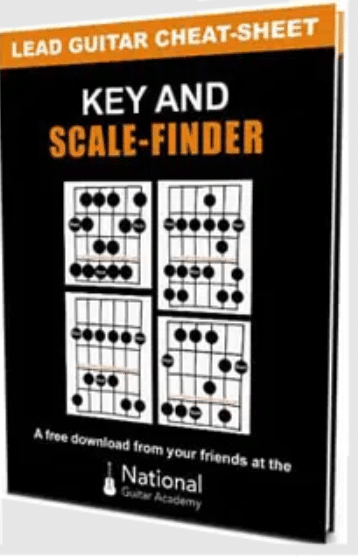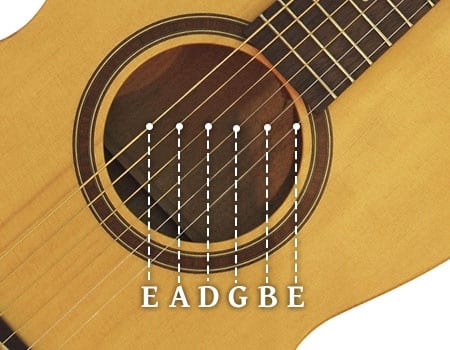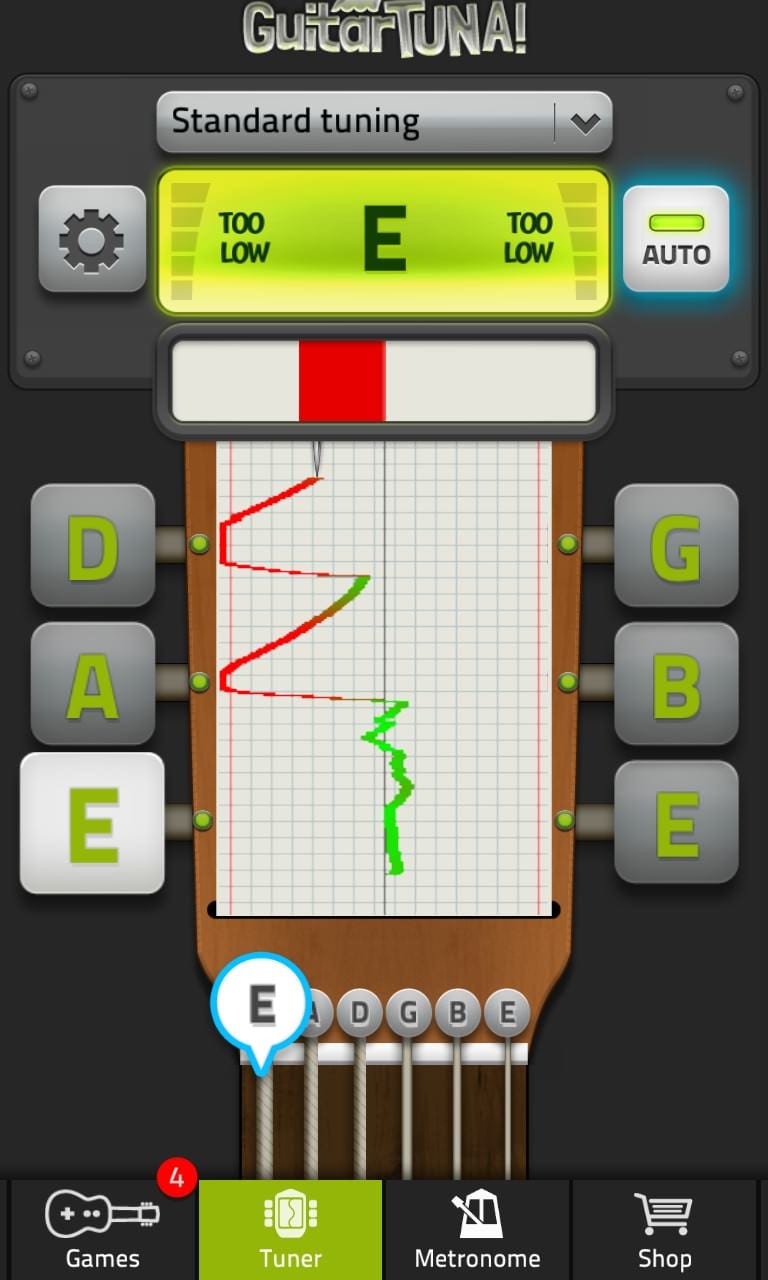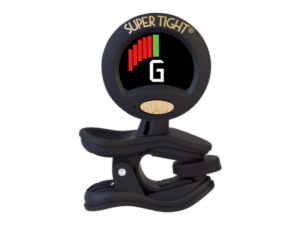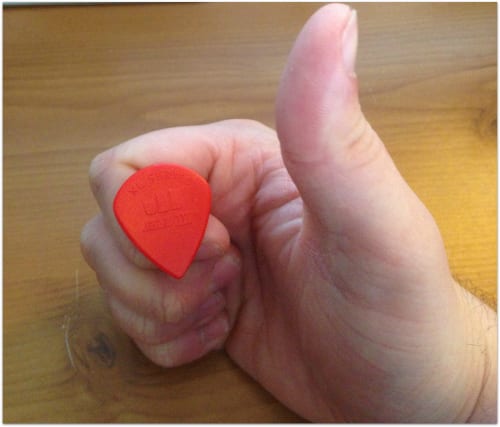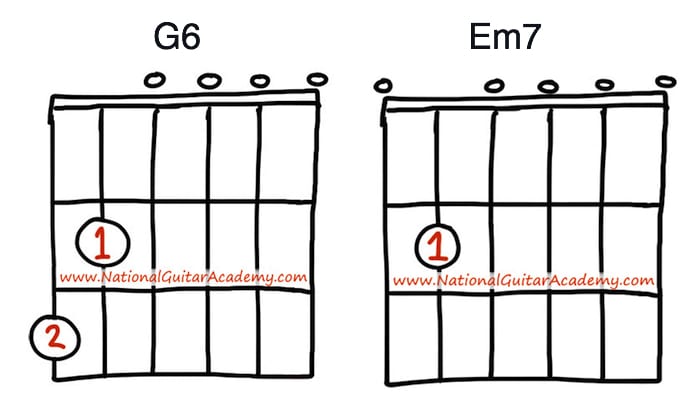Looking to learn your guitar basics? You’re in the right place!
In this free guitar lesson you will learn:
- The fundamentals of guitar basics; learn the anatomy of the guitar, guitar string names, how to tune a guitar & the secrets of guitar posture.
- 2 strumming tips that will enhance your rhythm & musicality.
- Essential guitar scales, chords & songs.
- The no1 secret to learning guitar quickly.
Let’s get started!
Over 100,000 guitar-learners get our world-class guitar tips & tutorials sent straight to their inbox:
Click here to join them Get our best guitar tips & videos
Guitar basics #1 The anatomy of the guitar
A guitar, like anything else has various bits to it, and those different bits have different names.
It’s important to know what these are otherwise it can be very confusing when your guitar teacher tells you to play the 5th string at the 3rd fret or something similar.
Here’s a nice clear diagram of the anatomy of the guitar:
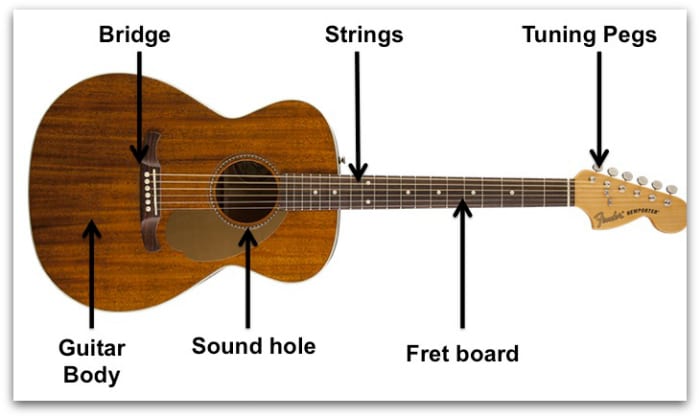
For more information on electric guitars, check out this article: How To Play Electric Guitar: A Beginner’s Guide
Guitar basics #2 String names
So, we can see from the guitar anatomy diagram that a guitar has six strings, but those strings aren’t all the same.
Going from the thickest to the thinnest, the guitar strings are named:
A good way of remembering this is:
- Eddie.
- Ate.
- Dynamite.
- Good.
- Bye.
- Eddie.
Guitar strings are also numbered 1 to 6, going from the thinnest to the thickest (not the other way around!)
For more information on guitar strings and what they’re called, check out this article: Guitar String Notes – The Ultimate Guide
Want free guitar tips and video lessons delivered to your inbox?
Join over 100,000 guitar learners and subscribe to our guitar-tips-by-email service. (It's free.)
We'll send you a series of lessons that will move you to the next level of your guitar journey.
Learn how everything fits together quickly, easily and effectively. We share ninja tips (for instant fun!) but also timeless fundamentals that will deepen your understanding.


Get our best guitar tips & videos
Our Guitar Courses
To become a better guitarist click here to see our guitar courses
Get your personalised guitar-learning plan 🎸
Want us to make a guitar-learning plan that is customised to you? Click here for GuitarMetrics™
Guitar basics #3 How to tune a guitar
If you want anything you play on guitar to sound good, your guitar needs to be in tune.
The best way to get in tune is to use a guitar tuner.
There’s a few different tuners available. If you have an iPhone for example, there’s a free app you can install called GuitarTuna.
Tuning apps are great, but they rely on the microphone from your phone (which aren’t always great.)
For better accuracy, a clip-on tuner like the Snark ST-8 is highly recommended. These tuners gauge whether you’re in tune by measuring the vibration from the strings at the headstock. It’s convenient and very simple to use.
Nevertheless, you still need to know the names of guitar strings, so you know what notes you’re tuning the strings to!
✅ Stop struggling. Start making music. ✅ Learn beginner-friendly versions of every chord. This is our most popular guide and it will improve your chord ability quickly! 😎 Get a custom guitar-learning plan here: Click here for GuitarMetrics™ Learn from the world's best guitar educators: Click here for our guitar coursesLearn 12 EASY beginner chords with our popular guide
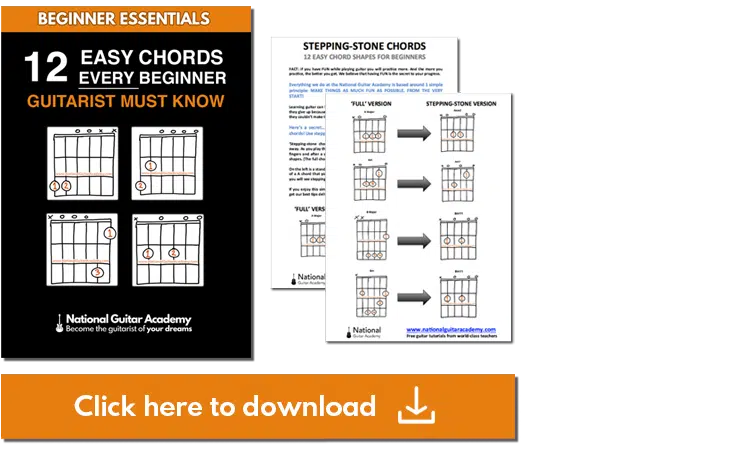
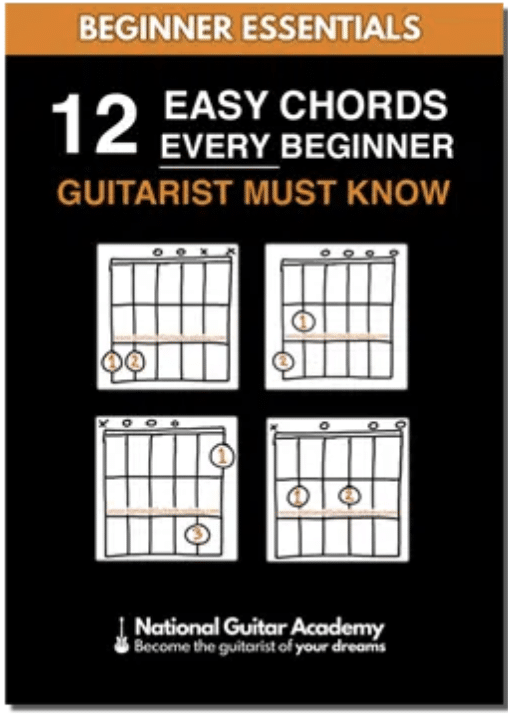
Where should we send it?
Get your own personalised guitar-learning plan 🎸
World-Class Guitar Courses 🌎
For more information on how to tune your guitar, check out this article: How To Tune A Guitar
Guitar basics #4 How to hold a guitar
Holding your guitar correctly is perhaps the most important thing you need to know if you want to be a guitarist.
If you don’t hold your guitar correctly, you’ll be uncomfortable and everything will be difficult to play.
Let’s start as we mean to go on.
If you’re right-handed, you want the body of the guitar resting on your right knee with the neck of the guitar pointing off to your left so you can strum and pick the strings with your right hand and press the strings down against the frets with your left hand.
If you’re left-handed, it’s the other way around: body on left knee, neck pointing to the right. Left hand for strumming, right hand for fretting.
For more information on how to hold a guitar correctly, check out this article: How To Hold A Guitar
Learning the guitar is good for you, it’s scientifically proven. Find out how in this article by Guitar World: 10 Scientifically Proven Reasons You Should Learn Guitar
Guitar basics #5 How to hold a guitar pick
If you don’t hold your guitar pick correctly, you’re going to have one hell of a time trying to strum and pick your guitar.
Again, let’s start as we mean to go on.
To hold your pick correctly, first…
Make a thumbs up sign
Then, place the pick on top of your clenched fingers, like this:
Lastly, clamp your thumb down on top of the pick:
For more information on guitar picks and how to hold them correctly, check out this article: How To Hold A Guitar Pick
Pro Tip: It’s important to try a variety of different guitar picks to find what works for you. Try to aim for something thin with flexibility but a bit of stiffness. We love (and highly recommend) the 1mm Maxgrip Nylon picks from Dunlop. They’re sturdy and flexible without being too thin.
Guitar basics #6 Basic chords
Once you’ve got your guitar in tune and you’re holding it correctly, it’s time to have a go at some chords.
You want to start with easy chords to begin with. The easier the better.
(If you don't understand the above image please read our article "How To Read Guitar Chordboxes In 60 Seconds". It will make everything clear!)
Don’t go stretching your fingers into all sorts of uncomfortable shapes trying advanced chords (or even intermediate chords).
Get to grips with the easy stuff first.
Ideally, you want to know your easy chords inside and out before you start trying anything tougher.
For some awesome beginner guitar chords, check out this article: Guitar Chords For Beginners
Guitar basics #7 How to strum
Once we’ve got our first chords learnt, we need to know how to strum them.
Strumming, for those who don’t know, is when you hit the strings of the guitar using the pick.
Like this:
There’s only really two ways to strum a guitar: downwards and upwards.
We use different combinations of down and up strumming to create different strumming patterns.
For a more in-depth look at how to strum the guitar, check out this article: How To Strum A Guitar
Guitar basics #8 Learn easy songs
There’s a reason we learn to tune our guitars, hold them correctly, strum chords etc.
It’s so we can play songs.
It should go without saying, but you want to be learning easy songs to begin with. Songs that use the sort of easy chords we mentioned earlier.
You don’t want to move onto anything more challenging until you’re totally happy you can play easy songs.
If you want some ideas for easy songs to get you started, check out this article: Guitar Songs For Beginners
Guitar basics #9 Learn guitar scales
The guitar isn’t just an instrument you strum chords on.
You can also, pick out melodies, riffs and solos. To do that, you need scales.
A scale is a pattern of notes that work with each other.
The best scales for beginners to start off with are scales that use open strings.
To get started learning scales on the guitar, check out this article: Beginner Guitar Scales: 5 Essential Scales
It's hard to understand which scales work with which keys.
So we created a cheat-sheet! A key and scale-finder that you can use again and again. Get a custom guitar-learning plan here: Click here for GuitarMetrics™ Learn from the world's best guitar educators: Click here for our guitar coursesDownload our lead guitar cheat-sheet to make things easier
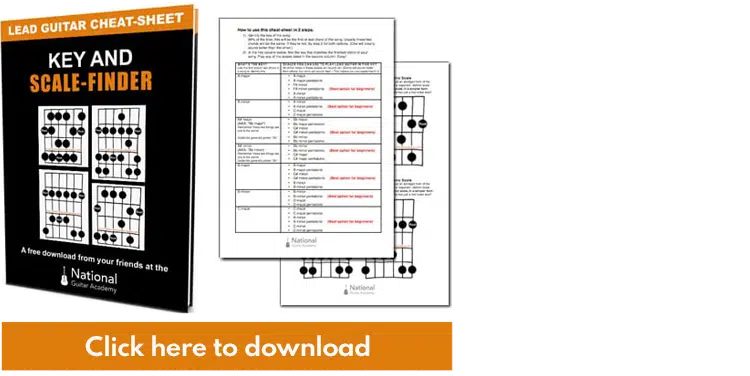
Get your personalised guitar-learning plan 🎸
World-Class Guitar Courses 🌎
Guitar basics #10 Learn how to practice effectively
Obviously if you’re learning guitar, you need to practice.
But how should you go about practicing?
The best approach is: little and often.
Don’t try and cram all your practicing into one day of the week.
For one, you’ll be giving yourself a huge workload.
On top of that, if you’re only practicing once a week, you’ll probably forget everything between practices.
Also, what if something comes up on the day you set aside for practice? You won’t get to practice that week.
Set aside a few minutes each day where you pick up your guitar and work through your basic chords, your easy songs, your scales or whatever it is you’re supposed to be practicing that week.
It’s also a good idea to invest in your learning.
Think about picking up a good guitar book online and seek out a good guitar teacher in your local area who will guide you on your journey!
For some top tips on practice, check out this article: Guitar Practice: 10 Essential Tips
Take our 60-second quiz & get your results: Take The Quiz Click here to learn more about National Guitar Academy membership Look cooler! Check out our merch: Click here to see our merch store Join over 100,000 guitar-learners and subscribe to our guitar-tips-by-email service. (It's free.) We'll send you a series of lessons that will move you to the next level of your guitar journey. Learn how everything fits together quickly, easily and effectively. We share ninja tips (for instant fun!) but also timeless fundamentals that will deepen your understanding.What Type of Guitarist Are You?
Join the world's best online guitar school 🌎
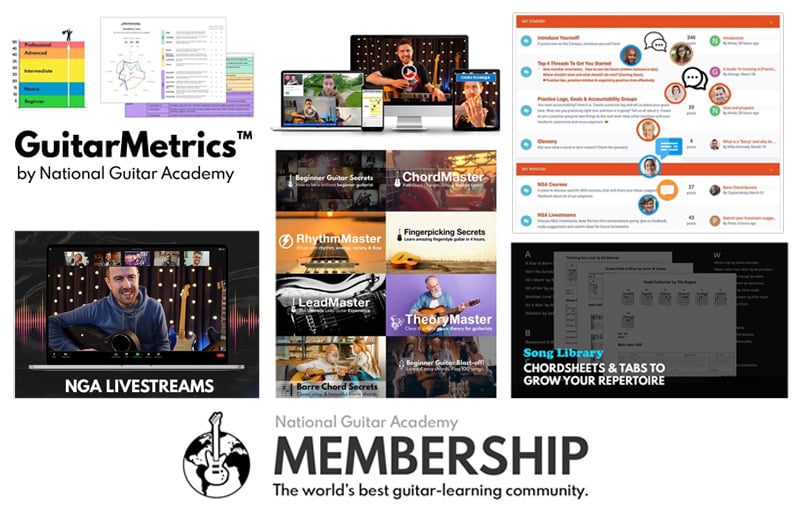
Cool Guitar T-shirts 😎
Want free guitar tips and video lessons delivered to your inbox?


Get our best guitar tips & videos
How To Learn Guitar: An 11-Step Programme For Beginners How To Choose The Perfect Beginner Guitar Learn about National Guitar Academy: About Us Join us on Facebook for daily guitar tips. Listen to our Learn Guitar Podcast for rapid guitar progress. Check out our free chord lessons.Popular Lessons
More Cool Guitar Stuff

